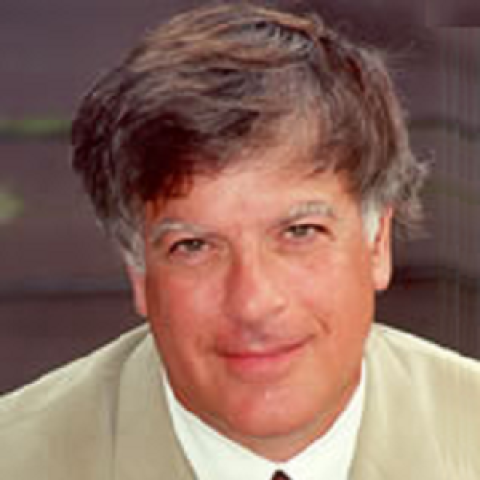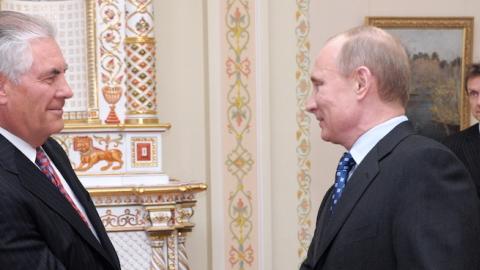With U.S.-Russia relations at a possible turning point, the confirmation hearings of Secretary of State-designate Rex Tillerson need to go beyond superficialities and weigh the true nature of Vladimir Putin’s regime. Senators should demand that the former Exxon Mobil CEO demonstrate an understanding of recent developments regarding three issues: the 2015 assassination of opposition leader Boris Nemtsov, the 2013 Boston Marathon bombing, and the 1999 Russian apartment bombings.
Nemtsov was shot repeatedly while walking near the Kremlin on the Bolshoi Moskvoretsky Bridge, an area under constant surveillance by Mr. Putin’s personal guard, the Federal Protective Service. According to expert analyses, the murder required the participation of no fewer than two dozen persons. Video cameras on the bridge were disabled, lookouts were placed at strategic locations, and a garbage truck appeared in front of the scene of the shooting to block it from view.
To this picture has now been added new information from two sources: Andrei Piontkovsky, a Russian publicist, and Igor Murzin, a St. Petersburg lawyer who specializes in working with video material. On Feb. 28, 2012, according to Mr. Piontkovsky (writing for the opposition website, Kasparov.ru, July 16, 2016), he and Nemtsov met Ahmed Zakaev, the leader of the Chechen separatist government in exile, in Oslo. Mr. Zakaev said that according to Chechen sources there was a plan to murder Nemtsov.
Nemtsov and Mr. Piontkovsky at first were skeptical but while they were discussing the warning Mr. Putin appeared on television and said he had information that members of the opposition were planning to murder an opposition leader and blame it on the authorities. The time between Mr. Zakaev’s warning and the announcement was 30 minutes. Nemtsov was killed shortly before midnight on Feb. 27, 2015. Hours later, the Russian media said he was a “sacrificial victim,” killed as part of a plot to discredit the authorities.
Mr. Murzin, in a Dec. 4, 2016, blog post about the Nemtsov murder, reported that he was able to analyze a videotape made from a car that passed the murder scene three minutes after Nemtsov was shot. The tape, which appeared on the internet, picked up fragments of conversation coming from the garbage truck. By slowing the audio, Mr. Murzin identified the words “Kornienko” and “shooting was not visible.” Gennady Kornienko is a general in the Federal Security Service, or FSB, the main successor to the KGB. He was also deputy director of Mr. Putin’s Federal Protective Service.
The second development involves the April 15, 2013, Boston Marathon bombing. According to U.S. law-enforcement officials, in 2011 the Russians sent a warning to the FBI that Tamerlan Tsarnaev, the older of the two brothers who carried out the attack, was a follower of radical Islam. Despite repeated requests, however, the Russians provided no further information.
In January 2012, Tsarnaev, an ethnic Chechen with permanent U.S. residency, traveled to Moscow on a Russian visa arriving at Sheremetyevo International Airport, where he was neither questioned nor detained. He then spent six months in Russia’s Dagestan region without being interrogated. During this period, two of Tsarnaev’s extremist contacts were killed by Russian forces. Tsarnaev nonetheless left Dagestan unhindered, passing through passport control at Sheremetyevo on his way back to the U.S.
In October 2016, Mr. Putin raised the subject of the Boston bombing at a meeting with Russian journalists following a summit in Goa, India. Contradicting Washington, he said U.S. officials had refused Russia’s offer to cooperate, telling them, in Mr. Putin’s words, “Mind your own business.” Because of that, Mr. Putin said he ordered FSB head Alexander Bortnikov not to provide any further information to the U.S. As a result, U.S. officials didn’t know that Tsarnaev had spent six months in the Dagestan region—a fact that, if known, could have prevented the Boston bombing.
There is also new information about the September 1999 Russian apartment bombings, the acts of terror that brought Mr. Putin to power. The bombings—in Moscow, Buinaksk and Volgodonsk between Sept. 4 and 13—killed 300 and were blamed on Chechen terrorists and used to justify the second Chechen war. The Chechens have always denied the accusation.
On Sept. 22, 1999, another bomb was discovered, in the basement of a building in Ryazan, southeast of Moscow. Two days later, two men and a woman were arrested for planting it. They turned out to be not Chechens but agents of the FSB.
After the arrests, Russian officials said the bomb was a fake and part of an FSB “training exercise.” The U.S. never officially challenged the Kremlin’s version of events, despite its implausibility.
Last month I received documents from the State Department in response to my pending Freedom of Information Act lawsuit. In a cable on the Ryazan incident, the U.S. Embassy in Moscow reported that a former member of Russia’s security services (name redacted) said that the true story of the Ryazan affair would never be known because “the truth would destroy the country.” The CIA, meanwhile, is refusing to release any information about the 1999 bombings, including its view about who was responsible.
The new administration needs to demand that all information about how Putin came to power be made a matter of public record. The failure of previous administrations to react to the 1999 apartment bombings and the 2006 murders of former FSB agent and Kremlin critic Alexander Litvinenko and investigative journalist Anna Politkovskaya led to the Obama administration’s “reset” policy and the Russian invasion of Ukraine. The failure to weigh the lessons of the murder of Boris Nemtsov, the Boston bombing and the apartment bombings will make possible a new “reset,” with consequences not difficult to foresee.


















